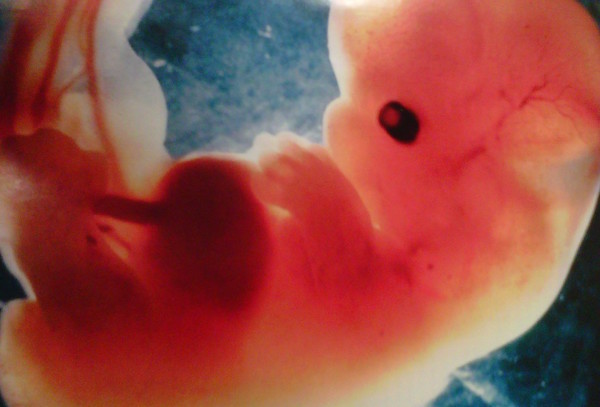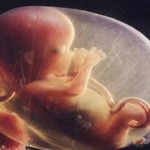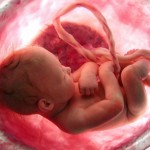What Gets Aborted?
by Steven Dillon
Filed under Morality, Sexuality
In his recent article "Do You Need God to Know That Abortion is Wrong?", Joe Heschmeyer shares an argument for why abortion is wrong. Now, the point of his article was not to advance or expound upon this argument, but it affords us with an opportunity to look into a common argument against abortion. As he states it, the argument goes like this:
"The pro-life argument is simple: (1) human beings are alive from the moment of fertilization, and (2) it is morally wrong (and ought to be illegal) to intentionally kill innocent human beings."
He goes on to say that “[t]he first point is a scientific one. The second is a moral and legal one, one that science can’t answer.”
Quibbles about validity aside, this simple argument encapsulates one of the most widely held reasons to be pro-life today: abortion is murder. But, the argument involves a number of problems including a crucial reliance upon an ambiguity which, when exposed, commits the pro-lifer to an untenable position.
You’ll notice that proponents of this sort of argument are adamant that (1) is a deliverance of science. And, indeed, “science” does tell us that the organism which humans produce through sexual intercourse is to be biologically classified as “human.” But, biological classifications do not always map to metaphysical classifications, and this becomes especially clear in the case at hand.
Metaphysically, the human being is an animal with rational powers. Her physical structure reflects the fact that she is an animal, and this is only to be expected since matter reflects whatever corporeal form of being it is in – e.g. solid, liquid, gaseous, sub-atomic, etc. But, as my pro-life interlocutors will agree, rationality is not a corporeal form of being. As such, it is not reflected in the physical structure of the human being.
(It may strike some of the Catholics here as bizarre that the presence or absence of rationality in a body makes no difference to its physical structure, but Catholics have long been committed to the position that human beings cannot, of their own power, reproduce members of their species: only God can create the human soul. As such, the body produced by humans only reflects the corporeal forms of being it is in, not the form of rationality.)
But, biologists classify substances according to the corporeal forms of life they come in. This is why you won’t find any talk of rational powers in Joe’s citation of Sandra Alter’s Biology: Understanding Life. In fact, as she says in the quotation, the cycle of human life she is describing is “representative of all animal life cycles.” So, the standards of humanity set by biology are not the same standards of humanity set by metaphysics, though the latter may include the former.
What all this means is that just because an organism satisfies the biologist’s criteria for being human does not mean that it satisfies the metaphysician’s criteria for being human. It’s not enough for a fetus to have this or that genotype, or whatever epigenetic primordia at whatever stage: such features are only reflective of corporeal forms of being, and the metaphysical human being enjoys more than just corporeal forms of being.
The ambiguity in the initial argument should be apparent at this point: in order to be valid, premises (1) and (2) have to mean the same thing by “human being.” But, premise (2) presents a metaphysical understanding of “human being” whereas (1) does not, being only “a scientific one.” Thus, the argument commits the fallacy of equivocation for using the same term in different ways, and the fallacy of non-sequitur for inferring a metaphysical categorization from a biological one.
However, matters are much worse than just that a premier argument against abortion is fallacious on several counts. As was stated above, metaphysically the human being is a rational animal. But, not just any ol’ parcel of matter can pass for an animal: there are features defining of the animal form of life that must be reflected in the matter. Now, my pro-life interlocutors (here at Strange Notions at least), will agree that, in terms of metaphysics, what is distinctive of the animal form of life is the power of sensation. But, nothing can have this power unless it also has the means by which to exercise that power; namely, sense organs. Just try to imagine having a sensation without having any means by which to sense, such as eyes to see or ears to hear.
The problem I’m raising is that there is at least one point in a biological human’s gestation at which she has no sense organs whatsoever: fertilization. Thus, the human zygote does not reflect any of the forms of animal life it would need to in order to be an animal in metaphysical terms. But, if the human zygote is not an animal, then, a fortiori, it is not a rational animal.
The standard pro-life argument encapsulated in Joe’s remarks therefore falls prey to a number of difficulties, including equivocation and non-sequitur. But, the going only gets tougher when we realize that the human zygote isn’t even an animal, let alone a rational one at that.
Related Posts
Note: Our goal is to cultivate serious and respectful dialogue. While it's OK to disagree—even encouraged!—any snarky, offensive, or off-topic comments will be deleted. Before commenting please read the Commenting Rules and Tips. If you're having trouble commenting, read the Commenting Instructions.












